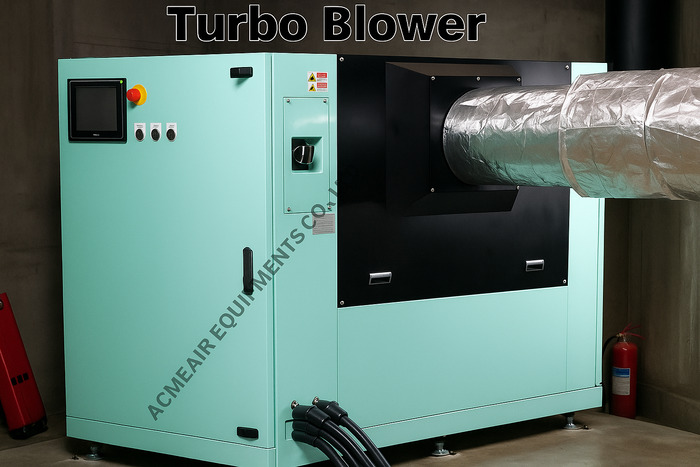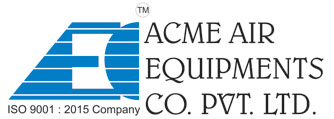Table of Contents
In the fast-paced and demanding world of the cement and construction industries, maintaining operational efficiency while meeting environmental and safety standards is essential. One of the technologies that have become indispensable in these industries is the turbo blower. These high-performance machines are not just about providing air movement; they are integral to optimizing processes, enhancing material handling, improving combustion efficiency and ensuring cleaner air quality within the plant.
Turbo blowers are now recognized as one of the best solutions for a range of applications, particularly in industries where high-pressure air and consistent airflow are critical. In this article, we will explore why turbo blowers have become the preferred choice for cement and construction companies and their undeniable benefits for such operations.
How Do Turbo Blowers Benefit Material Handling in the Cement Industry?
Material handling in the cement industry often involves the transportation of large volumes of bulk materials, such as raw meal, clinker and fly ash. Turbo blowers are integral to pneumatic conveying systems used to transport these materials. Here’s how they contribute to smoother and more efficient material handling:
Efficient Transport
Turbo blowers provide precisely controlled airflow, essential for transporting materials through pipelines in pneumatic conveying systems. The high-pressure airflow prevents blockages, clogs or material backflows, ensuring that the materials move efficiently from one part of the plant to another. In industries like cement production, where materials can be heavy and abrasive, high-speed turbo blowers ensure that the flow remains smooth and continuous, minimizing interruptions to the process.

Minimized Blockages and Interruptions
One of the most significant advantages of using energy-efficient turbo blowers is their ability to maintain consistent airflow, which reduces the chances of blockages or material jams in the system. Turbo blowers deliver high-pressure air that can push materials through even the most complex pipeline systems, preventing potential slowdowns or costly downtime caused by interruptions in material flow.
Reduced Manual Labor
By increasing the efficiency of material transport systems, turbo blowers reduce the need for manual labor in loading and unloading materials. In turn, this helps improve productivity and reduce the risk of worker injuries. The automation of material handling allows operators to focus on more strategic tasks, boosting overall operational efficiency in the cement plant.
What Role Do Turbo Blowers Play in Dust Collection and Air Filtration?
Dust control is a significant concern in the cement and construction industries, not only due to regulatory compliance but also for worker health and safety. High-Speed Turbo Blowers are crucial for improving air quality by powering dust collection and air filtration systems within the plant.
Optimized Air Filtration Systems
Energy efficient turbo blowers provide the required airflow to efficiently remove dust particles and contaminants from the air. By powering high-efficiency dust collection systems, they help in maintaining cleaner air within the plant environment, which is essential for both the longevity of the equipment and the health of workers exposed to dust particles.
Improving Worker Health and Safety
Prolonged exposure to dust, especially in cement plants, can lead to respiratory issues and long-term health problems for workers. High speed turbo blowers contribute to improving the working environment by ensuring that dust is collected effectively and air quality remains safe. By providing optimal airflow to dust collection systems, turbo blowers help mitigate the health risks associated with dust inhalation.
Reducing Equipment Wear and Tear
Excessive dust accumulation on machinery can lead to premature wear and tear, causing operational downtime and increasing maintenance costs. Turbo blowers help extend the lifespan of equipment by preventing the buildup of dust within machinery and ensuring clean air circulation, ultimately improving the plant’s overall efficiency and reducing maintenance costs.
How Do Turbo Blowers Improve Combustion Efficiency in Cement Production?
In cement production, one of the most energy-intensive processes is the combustion of fuel in the kiln. Consistent airflow is crucial for the efficient combustion of fuels, which directly impacts fuel efficiency, emissions and product quality. Turbo blowers play a significant role in optimizing combustion in cement plants:
Providing Consistent Airflow for the Kiln
Turbo blower delivers steady, high-pressure airflow to the combustion process, ensuring that fuel burns efficiently and completely. This consistency leads to a more stable combustion environment, improving the overall efficiency of the kiln and reducing the amount of fuel required to achieve the desired temperature.
Enhancing Fuel Efficiency and Reducing Emissions
By improving combustion efficiency, turbo blowers help cement plants reduce the consumption of fuel and, in turn, the emissions produced during the process. This is critical for meeting environmental regulations and minimizing the carbon footprint of cement production. The precise airflow controlled by turbo blowers ensures that fuel is burned more efficiently, leading to lower energy consumption and reduced greenhouse gas emissions.
Improving Clinker Quality
The kiln’s temperature control is vital to producing high-quality clinker, which is the main component in cement. With turbo blowers providing optimal airflow for combustion, plants can achieve more consistent and controlled temperatures, improving clinker quality and minimizing defects in the final product.
Where Are Turbo Blowers Used in the Construction Industry?
In addition to their application in cement manufacturing, turbo blowers are also integral to several operations within the broader construction industry. Their versatility makes them invaluable in various stages of construction and mining operations:
Ventilation Systems for Mining Operations
In mining, turbo blower manufacturers support ventilation systems, which are essential for maintaining safe and breathable air in underground environments. By ensuring a continuous flow of fresh air, turbo blowers help protect workers from hazardous gases and dust exposure, contributing to overall site safety.
Mineral Processing
Turbo blowers are also used in the mineral processing stage, where they provide the necessary airflow to transport crushed minerals and other materials through pipelines. Their high-efficiency performance ensures that these materials are transported smoothly and at a controlled rate, reducing the risk of blockages and improving processing efficiency.
Dust Control Systems in Construction Sites
Dust is a significant issue on construction sites, especially during demolition or excavation. Turbo blowers play a crucial role in controlling dust levels by providing consistent airflow to dust suppression systems, ensuring that the site remains safe and compliant with environmental regulations.
Conclusion
Turbo blowers are indispensable in both the cement and construction industries. They offer a range of benefits, including enhanced material handling, improved air filtration, optimized combustion efficiency and effective dust control. By choosing turbo blowers, companies can increase operational efficiency, reduce operating costs and ensure a safer, cleaner working environment for their employees.
The energy-efficient design of turbo blowers not only contributes to long-term sustainability but also helps plants meet the increasing demand for cleaner, more efficient industrial processes. With their ability to handle high-pressure requirements, maintain consistent airflow and enhance overall productivity, turbo blowers are essential for modern cement and construction operations seeking to stay competitive and environmentally responsible.
FAQs About Turbo Blowers
What makes turbo blowers more energy-efficient than traditional blowers?
Turbo blowers operate at much higher speeds than traditional blowers, allowing them to deliver the same airflow with less energy consumption. Their design maximizes performance while minimizing power usage.
Can turbo blowers handle abrasive materials like cement dust?
Yes, turbo blowers are designed to withstand harsh environments, including abrasive materials like cement dust, without significant wear and tear, ensuring a long service life.
How do turbo blowers improve worker safety in cement plants?
By improving dust collection and air filtration, turbo blowers contribute to cleaner air in cement plants, reducing health risks for workers and promoting a safer working environment.
Are turbo blowers customizable for specific industrial needs?
Yes, turbo blowers can be customized based on airflow requirements, pressure specifications and materials of construction to suit specific applications within the cement and construction industries.
How do turbo blowers help reduce emissions in cement production?
By providing consistent and efficient airflow to the kiln’s combustion process, turbo blowers ensure complete combustion of fuel, reducing fuel consumption and minimizing emissions.
About Author

CEO
Mr. Vishwesh Pardeshi is the CEO of Acme Air Equipments Company Pvt. Ltd., an industrial and engineering goods manufacturing company based in Ahmedabad, Gujarat (India). He has taken over the responsibility from founding Partners and Directors of the Company, and is now leading a talented group of professionals since 2020 by bringing in vast industrial and management expertise. By qualification, he holds a Bachelor Degree in Mechanical Engineering and also holds a MBA degree from reputed institutes. Under his leadership, the Company has successfully executed prestigious projects by delivering high quality and world class products from a state of the art manufacturing facility which combines CNC-enabled precision manufacturing and strong after sales support. In line with the Vision, Mission and Core Values of the Organization, Mr. Vishwesh Pardeshi continues to drive Quality, Reliability and Global Expansion at Acme Air Equipments Co. Pvt. Ltd.









